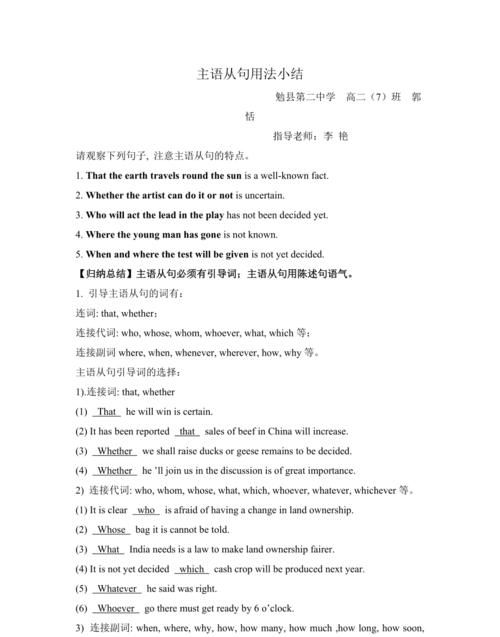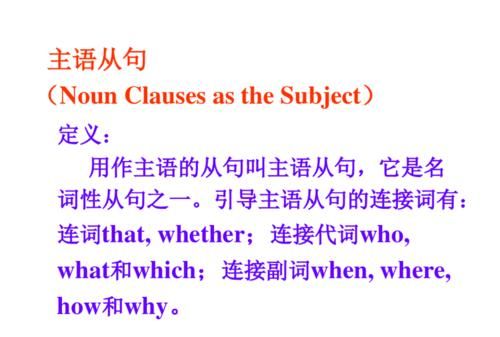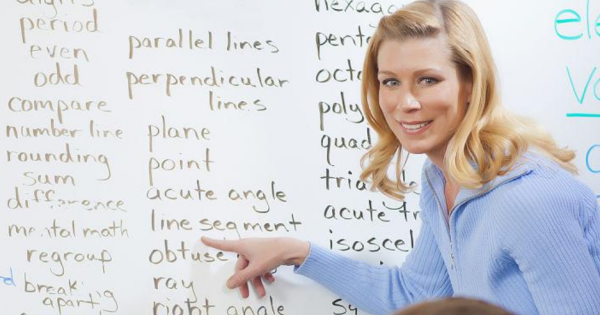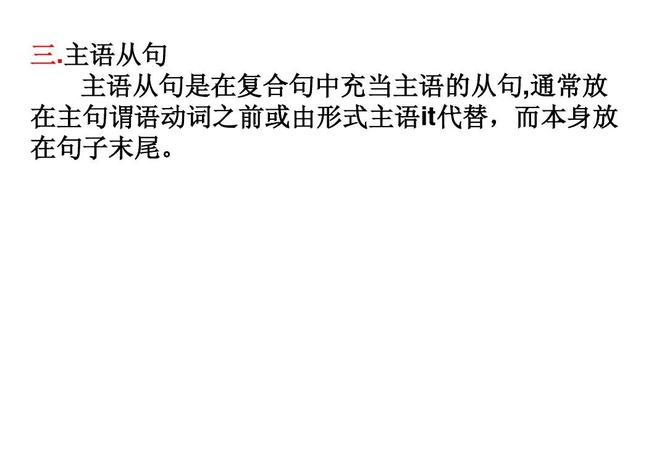本文目录
主语从句翻译句子和答案
It doesn't matter that she comes or not.
Whoever wants to join our club is welcomed.
Whatever you do at your spare time souldn't harm others.
How we can get there in time is what I think about.

英语主语从句和宾语从句的区别
主语从句就是一个从句,它做另一个句子的主语。
主语从句在复合句中作句子的主语。引导主语从句的词有连词that, whether; 连接代词who, what, which; 连接副词when, where, how, why等。如:
What is needed for the space trip is careful preparation.
Whether wild life can be well protected is of great importance.
Who will go makes no difference.
Why dinosaurs died out remains a puzzle.
Which kind of food is the best is still not certain.
为了避免主语显得过长,可以用it作为句子的主语,把主语从句移到句子的末尾。如:
It hasn’t been decided yet when the new restaurant will open.
It is not clear how gold was found there.
It is hard to understand why there is gravity.
It is a shame that you have to leave so soon.
宾语从句(The Object Clause)
宾语从句在复合句中作主句的宾语。宾语从句通常由下面一些词引导。
(1) 由that引导(that在口语或非正式文体中常省略)。如:
I don’t think (that) differences are important in a friendship.
Some readers said (that) they are going to eat more vegetables.
An old lady said (that) she found a job as a foreign language teacher.
I think (that) women can reach very high achievements in many fields of science.
(2)由连接代词或连接副词引导。如:
Thomas wants to know where Nina lives.
He wants to know what she thinks of the transportation.
It is interesting to hear what the class think about action movies.
I dinn’t know who the man was.
Do you know who (whom) John Adams was speaking to?
He asked whose spacesuit it was.
Pay attention what the doctor said, will you?
He can’t tell which gesture means “good luck”.
Please tell me when JoeWilliams won the Nobel Peace Prize.
I don’t know where Charlie Chaplin got his stick.
Will you tell me how I can keep fit and healthy?
Do you know why he crossed his arms?
(3) 由连词whether或if引导(口语中常用if)。如:
She asked me if she could borrow these books.
I wonder whether (if) Lin Qiaozhi remembered how many babies she had delivered.

主语从句例句及翻译
1、That he is still alive is a wonder.
2、That we shall be late is certain.
3、That he should have ignored the working class was natural.

4、That she is still alive is a consolation.
5、That she became an artist may have been due to her father's influence.
英语六大从句句式及例句
1.主语从句 1)主语从句可直接位于主语的位置,如果从句较长,谓语又较短,可用it作形式主语,而将从句放在句末。常见的句型有: *It is a fact\a pity\a question\good news that... 2)what引导的主语从句表示“...的东西时”,一般不用it作形式主语。 What we lack is experience. 3)what,who,when,why,whether等词含有各自的疑问意义,但它们引导的主语从句,都用陈述语序。 How the plan is to be carried out should be discussed again. 2.宾语从句 1)宾语从句可位于及物动词、介词和某些形容词后。连词that常可省略。介词后一般接疑问词引导的宾语从句。in that(因为),except that(除了),but that(只是)已构成固定搭配,其他介词后一般不接that引导的宾语从句。 *I promised that I would change the situation. 2.宾语从句 1)宾语从句可位于及物动词、介词和某些形容词后。连词that常可省略。介词后一般接疑问词引导的宾语从句。in that(因为),except that(除了),but that(只是)已构成固定搭配,其他介词后一般不接that引导的宾语从句。 *I promised that I would change the situation. 3.表语从句 表语从句出现在结构为“主语+系动词+表语从句”的句子中。表语从句除可用that,what,when,why,whether,how等引导外,还可由because,as if(though)等引导。that常可省略。如主句主语为reason,只能用that引导表语从句,不可用because. Perhaps the most important thing to remember is that there is no one common type of life in America. 2)宾语从句后如有宾补,要用形式宾语it来代替,而把宾语从句移至宾补之后。 He has made it clear that he would not change his mind. 4.同位语从句 同位语从句用于对前面出现的名词作进一步说明,一般用连词that引导,由于先行名词的意义不同,也可用whether,who,when,where,what,why,how等引导。常见的先行名词有fact,idea,belief,news,hope,conclusion,evidence,suggestion,order,problem,report,decision.有时由于谓语较短,将同位语从句位于谓语之后。 She finally made the decision that she would join the fashion show. 5.定语从句 定语从句所修饰的先行词可以是名词或代词,也可以是一个句子。定语从句通常位于先行词之后,由关系代词或关系副词引导。 *限制性定语从句 限制性定语从句修饰先行词,对先行词起修饰作用,紧接先行词之后,无逗号,若省去,原句意思不完整。引导定语从句的关系代词有who,whom,whose,which,that等。who,whom,whose用于指人,whose有时也可指物,相当于of which;which用于指物;that既可指人也可指物,但只用于限制性定语从句中。关系代词除了引导定语从句,替代先行词外,还在从句中担任主语、宾语、定语等。 The computers and cables which make up the Internet are owned by people and organizations. Those who live alone or who are sick may have trouble in getting close to other people. The girl whose parents died in an accident is living with her grandmother. 1)当先行词是all,anything,everything,something,nothing等不定代词或先行词前有first,last,any,few,much,some,no,only以及形容词最高级修饰时,只能用关系代词that引导从句。 That is all that I've heard from him. He's the first person that I'm going to interview this afternoon. 2)关系代词的省略 在从句中作宾语的关系代词常可省略。关系代词紧跟介词,作介词宾语时不可用that,只可用which或whom引导从句,并且不可省略,但当介词位于宾语从句句末时,作为介词宾语的关系代词仍可用that,也可省略。 This is one of those things with which we have to put up. This is one of those things (which\that) we have to put up with. 3)引导定语从句的关系副词有when,where,why等。关系副词在从句中作状语,意义上相当于一个“介词+which”的结构。 Even in comic books where(=in which) there are no words,the stories are fully expressed through the drawings. No one knows the reason why(=for which) he was so angry that day. 6.状语从句 *时间状语从句 引导时间状语从句的从属连词和词组有: 1)when,whenever,while,as,after,before,since,till,until,once等。 We have learnt quite a lot about it since we came here. 2)as soon as,hardly(scarcely)...when,no sooner...than,each(every) time,the moment,immediately(that)等。 As soon as I sent an e-mail message,I received positive responses. The moment he heard the good news,he jumped with joy. *地点状语从句 引导地点状语从句的连词是where,wherever. Wherever she went,she took her little daughter with her. *原因、结果和目的状语从句 1)引导原因状语从句的从属连词有:because,as,since,now(that),seeing that,considering that,in that等。 Considering that he is a freshman,we must say he is doing well. 2)引导结果状语从句的连词有:so...that,such...that,so that,that,so等。 Mickey Mouse is so attractive that the children are reluctant to leave. 3)引导目的状语从句的连词有:so that,in order that,for fear that,lest等,从句常使用may,might,can,could,would等情态动词。 We got up early this morning so that we could catch the first bus to the railway station. *条件和让步状语从句 1)引导条件状语从句的连词和词组有if,unless,as(so) long as,on condition that,in case,provided(providing) that,supposing等。 As long as you have the right equipment,you can use a telephone line to transmit computer data. 2)引导让步状语从句的连词和词组有though,although,whether,even though,even if,no matter what(when,how...),whatever(whenever,wherever,however....)等。though,even if等引导状语从句可转换成含有as的部分倒装结构,具有强调意义。其结构为“形容词(副词、动词、名词)+as+主语+谓语”。 No matter what you may say,I would not change my mind. Young as he is,he is quite experienced in this work.(=though he is young) Child as he is,he can speak English fluently.(=though he is a child) *方式状语从句 引导方式状语从句的连词有as,just as,as if,as though等。as if,as though引导的状语从句中,谓语动词常用虚拟语气,表示与事实相反。 The young man made the experiment just as the teacher had taught him. Everything went on as usual as if nothing had happened.

以上就是关于十个主语从句例句及翻译 ,主语从句翻译句子和答案的全部内容,以及十个主语从句例句及翻译 的相关内容,希望能够帮到您。

